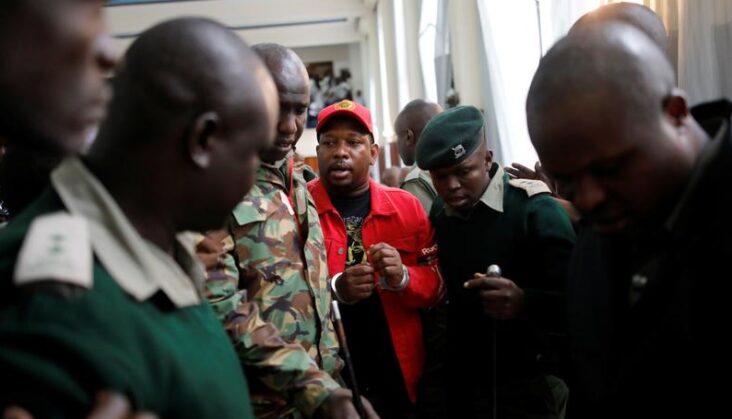The handing over of power from Nairobi Governor Mike Sonko to the government may not be what it seems.
Nairobi Governor Mike Sonko, facing an imminent impeachment process, handed over several critical functions of the capital city to President Kenyatta’s government.
In a statement on Tuesday, Kenyatta’s spokesperson Kanze Dena-Mararo said the government would take over health, transport, and two other functions from the Sonko government.
- In the deal, which starts in mid-March and will last for two years, Kenyatta’s minister for devolution, Eugene Wamalwa, will co-manage the city with Governor Sonko.
- The government will also make annual reports to both the national and county legislatures“The move comes as a breakthrough in the running of country services that had ground to a halt,” Dena-Mararo wrote.
While it might appear as if Governor Sonko has surrendered crucial executive and political power, it is in fact a brilliant manoeuvre on his part.
Sonko, who took over in August 2017 with a promise to improve service delivery, has had a hard time managing the capital.
Some of the problems have been of his own making.
A city politician who has risen fast in the last decade and a half, switching posts from Senator to Governor in the last two elections, Sonko’s reign has been a daily soap opera.
- He has not had a deputy since the resignation of Polycarp Igathe, who quit due to differences with his boss.
- He has also been in the news after details of his criminal record became public, with a 2005 death certificate with his name on it doing the rounds around the same time.
- Sonko is also facing charges of corruption and abuse of office, after his arrest last December.
Sonko also faces a hostile legislature, which plans to begin impeachment hearings in days, and has constantly reshuffled his cabinet.
But the main reason he wants Kenyatta’s government to be in direct control of critical functions has to do with deep-rooted cartels.
- “The cartel in this city is too big,” Governor Sonko said last year, addressing a crowd but speaking to President Kenyatta, who was standing atop a vehicle behind him. “I need your help to dismantle it.”
- “If its revenue, take it to the National Government. If it’s planning, take it to the National Government,” he offered. The video of the speech has been Governor Sonko’s only public comment since signing the transfer documents
Sonko’s decision is more than just about executive power, the timing has more to do with political survival.
Sonko’s immediate problem is the looming impeachment, which became even more likely after the removal of his neighbour, former Kiambu Governor Ferdinand Waititu, from the county legislature and the National Senate.
By handing over critical functions, which are home to various interests in and outside the legislature due to try him for impeachment, he has also outmanoeuvred them.
“What Sonko has done is to hand us over to the wild dogs. He saw that he will be impeached and to save him the embarrassment, he decided to give up some of the county functions,” Nairobi Minority leader David Mberia was quoted as saying by local media.
By Wednesday morning, some of Sonko’s changes were already being removed.
Succession drama
While the deal will take effect in 21 days, it a done deal in Kenya’s current political climate. And with the Kenyatta Administration running the most important city, it would boost Kenyatta’s ratings as he winds up his last term.
- The Building Bridges Initiative (BBI) report suggested granting Nairobi a special status, so its management is not based on an elective process.
- By taking over the critical functions, which will also include their revenues and expenditures, Kenyatta also has a new item on his balance sheets. But it could also be a poisoned chalice, given the results of similar moves by his predecessors.
It also works at the political level for Kenyatta.
Governor Sonko, probably Nairobi’s most important politician, had gravitated towards Deputy President William Ruto in the ongoing succession politics.
Having a politician of his public effect back in his camp will grant Kenyatta a much-needed ally in his short-term goals, which are to mend the economy and halt Ruto’s likely succession.
- But this could backfire on both: Sonko might survive impeachment and regain some control of the capital city, and this deal covers the remaining two years of his reign.
- President Kenyatta’s move might also be seen as another assault on the devolved system of government, which has included underfunding the 47 counties and not paying their share in time.
Historic problem
Managing the capital, which is home to 4.4m people today, has always been a challenge.
All of Kenya’s presidents since independence have tried to have a direct executive hold on the capital, due to its role as the country’s economic, social, and political nerve centre.
One of the first post-independence’s government’s crisis was the mayor’s attempt to acquire a better car than the president. But there were also many serious issues, both inherited and emergent.
- President Jomo Kenyatta maneuvered in his daughter, the current President’s step-sister, to run the city in the ‘70s.
- In the early ‘80s, the second President Daniel Arap Moi dismissed the capital’s elected officials and appointed a commission to run the city instead. The commission, which was changed a number of times over the next decade, failed in its task too.
- It was a commission managing Nairobi in 1989 when the government planned to build a 60-storey multipurpose skyscraper in Uhuru Park, the capital’s biggest public recreational space.
- The third President, Mwai Kibaki, tried another route, creating a cabinet position to handle infrastructure for Nairobi and the metropolis.

